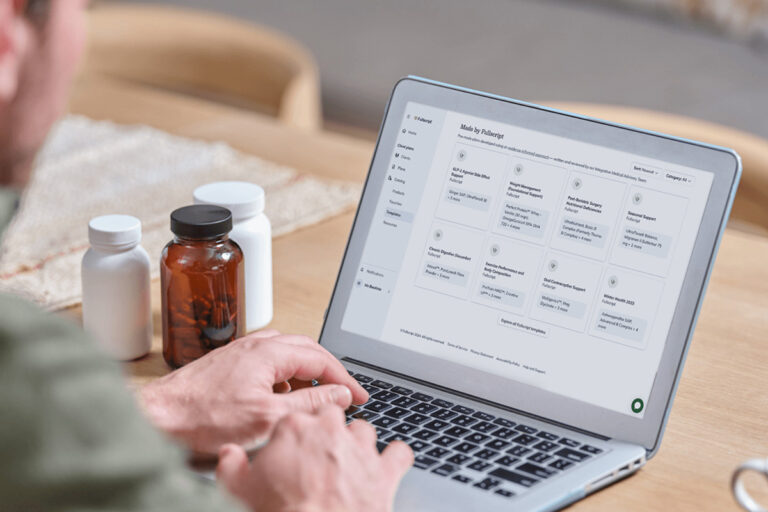What is irritable bowel syndrome?
IBS is a chronic multifactorial GI disorder characterized by altered intestinal microbiota, dysmotility (i.e., muscles of the GI tract do not work properly), inflammation, and visceral hypersensitivity (i.e., abdominal discomfort). Approximately 40 to 60% of patients also experience comorbid psychological disorders such as depression and anxiety. (19) IBS is considered an abnormal functional GI disorder that cannot be attributed to other common GI diseases such as a peptic ulcer or gastric cancer. (12)IBS should not be confused with inflammatory bowel disease (IBD), which is an autoimmune condition that causes inflammation of the GI system.
When it comes to the natural remedies for IBS, eliminating or reducing symptoms of IBS is key.

Common symptoms of IBS include constipation, diarrhea, and bloating.
Natural remedies for IBS
From a conventional standpoint, IBS treatment is focused on symptom management utilizing a variety of pharmaceutical interventions including antidepressants, anti-diarrheal medications, anti-inflammatories, antispasmodics, mu opioid receptor agonists, polyethylene glycol, and pro-secretory and serotonergic agents. (5)Natural remedies for IBS typically include a combination of diet, lifestyle, and dietary supplement recommendations. This integrative approach can help reduce or eliminate symptoms while enhancing the overall quality of life.
Dietary interventions
Below are some statistics that illustrate the connection between diet and its significant role in the development of IBS:- More than 60% of IBS patients report an onset or worsening of symptoms following a meal.
- 93% of IBS patients report symptoms within three hours of the meal, and 28% report symptoms within 15 minutes of the meal.
- 84% of IBS patients report meal-related symptoms associated with at least one food item.
- In general, self-reported food intolerance correlates directly with increased symptoms and decreased quality of life. (3)
Eliminating offending foods will help manage symptoms and slow illness progression. An elimination diet can include focusing on a single common culprit, such as fructose or lactose, or embarking on a broader elimination protocol, such as the low-FODMAP diet. Elimination diets should be followed under the supervision of an experienced integrative practitioner. (20)
In addition to targeted dietary advice, stress can play a significant role in the onset or exacerbation of IBS symptoms.
Lifestyle considerations
When it comes to the development of IBS and symptom severity, stress is one of the biggest lifestyle factors. IBS is a stress-sensitive disorder as psychological stress influences the gut-brain axis by altering the neuro-endocrine-immune pathways leading to symptom flare-ups and a worsening of the condition. (14)Stress is also linked to the original onset of IBS. A 2018 study featuring surveys from 561 medical students found that those with academic overload and a perceived lack of time were at a significantly higher risk of developing IBS compared to the students who weren’t overloaded. (13)
As a result of the clear link between stress and IBS, providing patients with stress management tools, such as meditation, deep breathing, and journaling, should be included in their IBS treatment protocol.

Managing your stress levels can help reduce flare-ups of IBS symptoms.
Dietary supplements for IBS
Dietary supplements can also play an important role when it comes to natural remedies for IBS. The goal with dietary supplements in IBS is two-fold: correcting or preventing potential nutrient deficiencies and reducing or eliminating symptoms.Preventing nutrient deficiencies
Some restrictive diets can lead to nutritional deficiencies that need to be addressed proactively. For example, a gluten-free diet can result in potential deficiencies in calcium, folate, iron, magnesium, selenium, and zinc, while the low-FODMAP diet can also lead to calcium deficiency. (15) A dairy-free diet can result in calcium deficiency. IBS patients, in general, also have a high prevalence of vitamin D, (8) vitamin B6, (9) and zinc deficiencies (7) regardless of the type of diet they are following.Your integrative healthcare practitioner can help you monitor your nutritional status and address any nutrient deficiencies. Careful planning of your diet can help avoid or reduce the risk of developing a nutrient deficiency.
Managing symptoms
From a symptom management standpoint, the most widely studied herbal medicine for IBS is enteric-coated peppermint oil. Several randomized, double-blind, placebo-controlled trials show that enteric-coated peppermint oil significantly reduces IBS symptom severity, pain, and duration compared to a placebo. (6)Another study examined the effects of STW 5 (Iberogast), a German product containing several different herbal extracts, including peppermint leaves, angelica root, chamomile, caraway, and milk thistle. While it has been studied extensively to treat functional indigestion and heartburn, a double-blind, randomized, placebo-controlled, multi-center trial showed that STW 5 also reduced total abdominal pain scores and overall IBS symptom scores better than a placebo. (10)
Preliminary research also shows that artichoke leaf may help reduce IBS symptoms. (6) A clinical trial also demonstrated that the Tibetan herb Padma Lax was effective specifically for IBS constipation-related pain. (17)
Probiotics can also help with IBS symptoms although dosage and strains still need to be confirmed. A 2010 review described research demonstrating that a variety of strains can help improve many IBS symptoms including abdominal pain, bloating, and cramping. (2)
Whereas short-chain soluble highly fermentable fibers can exacerbate IBS symptoms, long-chain viscous fibers like psyllium can help with IBS symptoms. A 2017 review points out that soluble moderately fermentable fibers, especially psyllium, work in the gastrointestinal tract to relieve several IBS symptoms through various mechanisms. (4)
The bottom line
IBS is a common painful condition that can significantly and negatively impact a person’s quality of life. Fortunately, there are effective natural remedies for IBS that include dietary guidance, stress management, and targeted dietary supplements.- American College of Gastroenterology. (n.d.). Irritable Bowel Syndrome. https://gi.org/topics/irritable-bowel-syndrome/
- Aragon, G., Graham, D. B., Borum, M., & Doman, D. B. (2010). Probiotic therapy for irritable bowel syndrome. Gastroenterology & hepatology, 6(1), 39–44.
- Cuomo, R., Andreozzi, P., Zito, F. P., Passananti, V., De Carlo, G., & Sarnelli, G. (2014). Irritable bowel syndrome and food interaction. World journal of gastroenterology, 20(27), 8837–8845.
- El-Salhy, M., Ystad, S. O., Mazzawi, T., & Gundersen, D. (2017). Dietary fiber in irritable bowel syndrome (Review). International journal of molecular medicine, 40(3), 607–613.
- Ford, A. C., Moayyedi, P., Chey, W. D., Harris, L. A., Lacy, B. E., Saito, Y. A., & Quigley, E. M. (2018). American College of Gastroenterology monograph on management of irritable bowel syndrome. The American Journal of Gastroenterology, supplement.
- Grundmann, O., & Yoon, S. L. (2014). Complementary and alternative medicines in irritable bowel syndrome: an integrative view. World journal of gastroenterology, 20(2), 346–362.
- Hujoel, I. A. (2019). Nutritional deficiencies in irritable bowel syndrome: a North American population-based study. The American Journal of Gastroenterology, 114, S274.
- Khayyat, Y., & Attar, S. (2015). Vitamin D Deficiency in Patients with Irritable Bowel Syndrome: Does it Exist?. Oman medical journal, 30(2), 115–118.
- Ligaarden, S. C., & Farup, P. G. (2011). Low intake of vitamin B6 is associated with irritable bowel syndrome symptoms. Nutrition Research, 31(5), 356-61.
- Madisch, A., Holtmann, G., Plein, K, & Hotz, J. (2004). Treatment of irritable bowel syndrome with herbal preparations: results of a double-blind, randomized, placebo-controlled, multi-centre trial. Aliment Pharmacol Ther, 19(3), 271-9.
- Mansueto, P., D’Alcamo, A., Seidita, A., & Carroccio, A. (2015). Food allergy in irritable bowel syndrome: The case of non-celiac wheat sensitivity. World journal of gastroenterology, 21(23), 7089–7109.
- Mearin, F., & Malfertheiner, P. (2017). Functional Gastrointestinal Disorders: Complex Treatments for Complex Pathophysiological Mechanisms. Digestive diseases (Basel, Switzerland), 35 Suppl 1(1), 1–4.
- Pozos-Radillo, E., Preciado-Serrano, L., Plascencia-Campos, A., Morales-Fernández, A., & Valdez-López, R. (2018). Predictive study of academic stress with the irritable bowel syndrome in medicine students at a public university in Mexico. The Libyan journal of medicine, 13(1), 1479599.
- Qin, H. Y., Cheng, C. W., Tang, X. D., & Bian, Z. X. (2014). Impact of psychological stress on irritable bowel syndrome. World journal of gastroenterology, 20(39), 14126–14131.
- Rej, A., Aziz, I., Tornblom, H., Sanders, D. S., & Simren, M. (2019). The role of diet in irritable bowel syndrome: implications for dietary advice. Journal of Internal Medicine, 286(5), 490-502.
- Sadeghian, M., Sadeghi, O., Hassanzadeh Keshteli, A., Daghaghzadeh, H., Esmaillzadeh, A., & Adibi, P. (2018). Physical activity in relation to irritable bowel syndrome among Iranian adults. PloS one, 13(10), e0205806.
- Sallon, S., Ben-Arye, E., Davidson, R., Shapiro, H., Ginsberg, G., & Ligumsky, M. (2002). A novel treatment for constipation-predominant irritable bowel syndrome using Padma Lax, a Tibetan herbal formula. Digestion, 65(3), 161-71.
- Wang, B., Duan, R., & Duan, L. (2018). Prevalence of sleep disorder in irritable bowel syndrome: A systematic review with meta-analysis. Saudi journal of gastroenterology : official journal of the Saudi Gastroenterology Association, 24(3), 141–150.
- Weaver, K. R., Melkus, G. D., & Henderson, W. A. (2017). Irritable Bowel Syndrome. The American journal of nursing, 117(6), 48–55.
- Werlang, M. E., Palmer, W. C., & Lacy, B. E. (2019). Irritable Bowel Syndrome and Dietary Interventions. Gastroenterology & hepatology, 15(1), 16–26.





